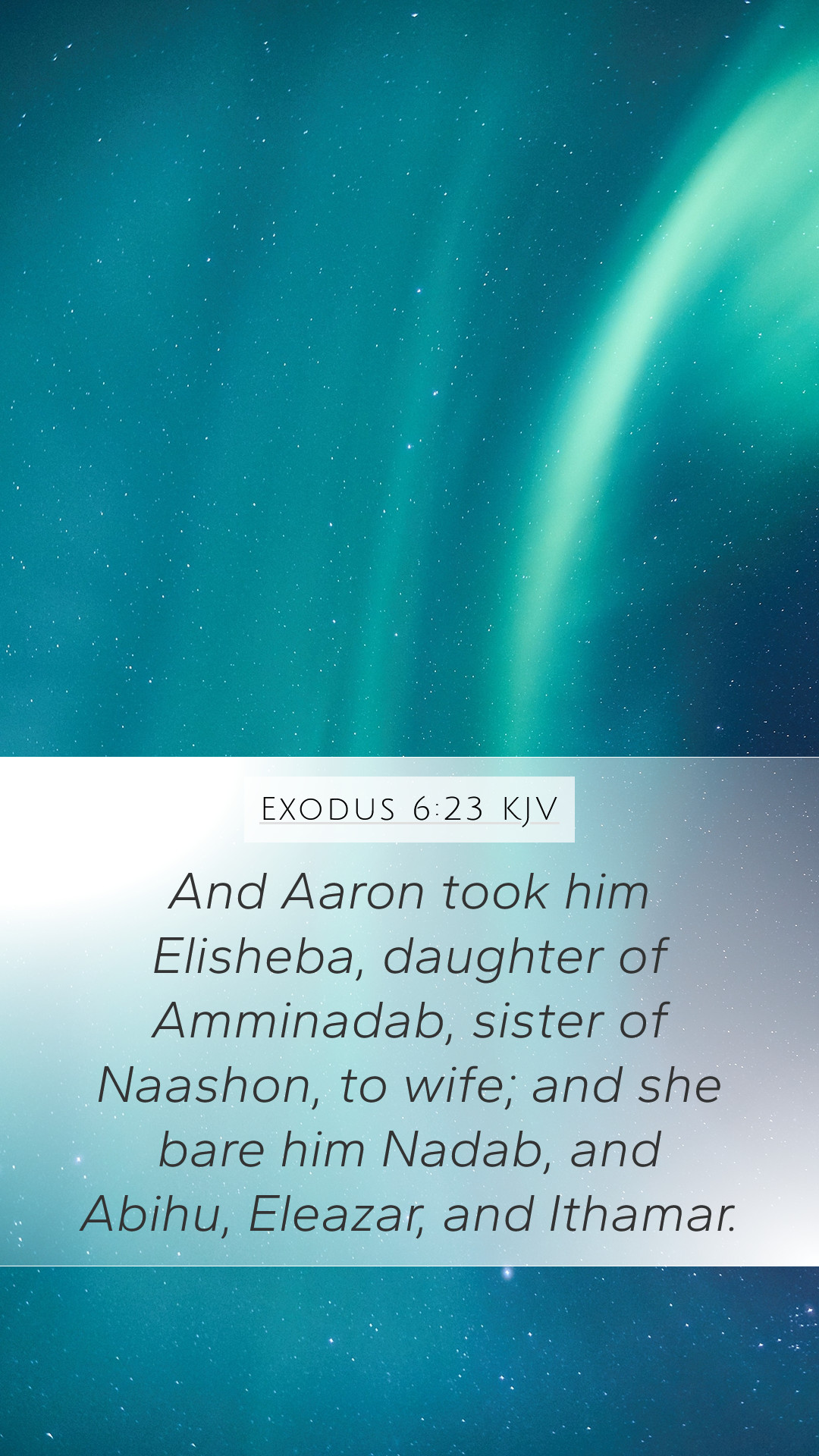Exodus 6:23 - Meaning and Interpretation
Bible Verse: Exodus 6:23 - "And Aaron took him Elisheba, the daughter of Amminadab, sister of Nahshon, to wife; and she bare him Nadab and Abihu, Eleazar and Ithamar." (KJV)
Overview
This verse serves as a genealogical note within the narrative of the Israelites' deliverance from Egypt. It highlights the family connections of Aaron, the brother of Moses and the first high priest, establishing his lineage and the subsequent priestly descendants who will play a significant role in Israel's worship and community structure.
Bible Verse Meanings
The passage presents several layers of meaning and context that offer insight into the social, religious, and historical aspects of the Israelite community. Understanding these layers involves examining the relationships and roles within Aaron's family as well as the implications of their priestly lineage.
Key Insights from Commentaries
- Matthew Henry's Commentary:
Henry notes that the reference to Aaron taking Elisheba as his wife emphasizes the importance of priestly lineage in establishing leadership among the Israelites. The choice of a spouse within the same tribe reflects both family ties and the sanctity expected in priestly roles.
- Albert Barnes' Commentary:
Barnes points out that the children of Aaron, particularly Nadab and Abihu, later play crucial roles in the Levitical priesthood, underscoring the significance of this familial relationship. The mention of their mother emphasizes their heritage, which was vital for their future responsibilities in the community.
- Adam Clarke's Commentary:
Clarke elaborates on the names and roles of Aaron's sons, highlighting their involvement in the Tabernacle and sacrificial rituals. He notes that understanding their lineage helps in grasping the continuity of priestly duties and the importance of holy lineage in the Old Testament.
Biblical Exegesis
This verse invites readers to look beyond the genealogical information and consider its theological implications. The relationships established here not only speak to the social fabric of the Israelites but also to God's design for priestly mediation between Himself and His people.
Historical Context
In the context of the Exodus narrative, Aaron's marriage and subsequent family lineage signify God's plan of redemption through designated leaders. During this period, maintaining strict purity and clear lineages was critical for worship and governance, reflective of broader themes in the Torah concerning holiness and separation from the nations.
Application of Scripture
For modern readers, understanding Exodus 6:23 can shed light on the significance of our own familial and spiritual ties. Just as Aaron’s family played an essential role in leading the Israelite nation, we are reminded of our own positions within our communities and families and the responsibilities they entail.
Bible Study Insights
As groups engage in online Bible study or utilize Bible study tools, Exodus 6:23 provides an excellent opportunity to discuss themes of leadership, responsibility within families, and the concept of being chosen for roles within the faith community.
Related Cross References
- Exodus 28:1 - Aaron and his sons are consecrated as priests.
- Leviticus 10:1-2 - The story of Nadab and Abihu, emphasizing the importance of careful adherence to God's instructions.
- Numbers 3:1-4 - Further establishment of Aaron's descendants as priests.
Conclusion
Exodus 6:23 is more than a simple genealogical note; it intertwines historical significance with theological depth. Recognizing the roles that families play in God's design helps deepen our understanding of Scripture and enhances our Bible study experience.
Keywords: Bible verse meanings, Bible verse interpretations, Bible study insights.


